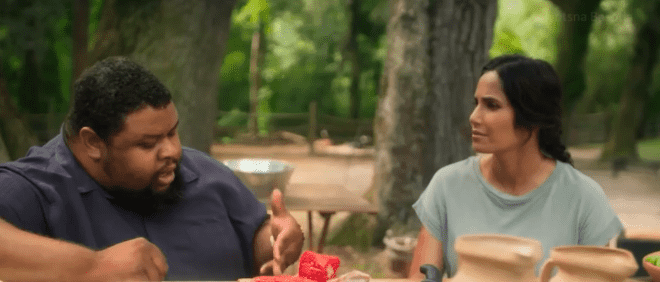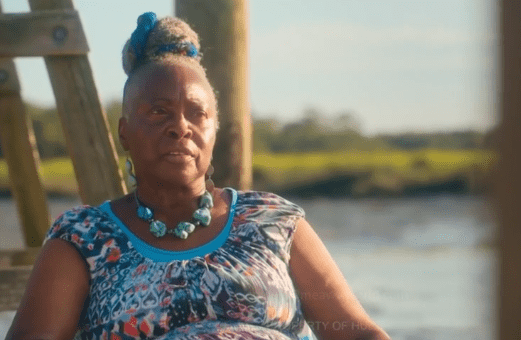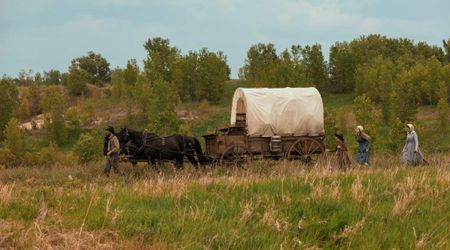'Taste the Nation': A look into the dark era of slavery in America as 'The Gullah Way' takes us back in time

Spoilers for 'Taste the Nation'
Hulu's 'Taste the Nation' with cookbook author and host of Bravo's 'Top Chef' Padma Lakshmi, is a remarkable lesson in American history that speaks of dark truths such as enslavement and discrimination. In one of the episodes titled 'The Gullah Way,' the past and present of the Gullah Geechee people are showcased with sensitivity and pride. From catching and cooking crab to understanding why their staple food is rice, the episode is one of many that brings to the fore the history behind so many loved dishes.
This episode is one that stands out for many reasons but one that resonates most in times like the present was the atrocities faced by the Gullah people during enslavement. We're shown how when the Gullah Geechee people were free, they used their knowledge, spirit, and ancestral land to curate a culture that has been passed down for generations. Now, in the present, they still fight to preserve their history and culture that so heavily influenced the American south.
Padma visits Charleston, South Carolina where we first hear from Michael Twitty, a descendent of the Gullah Geechee people and an award-winning gifted culinary historian who is dedicated to keeping the stories of his ancestors alive and thriving. Plantations like Middleton Place are where some of these stories began said Twitty who also spoke of how at times 300 plus years of history that has been sustained for generations often gets lost. The Gullah Geechee people are descendants of West Africans that were brought to the United States and were enslaved in southern plantations. There are about 200,000 of them that now live from northern Florida to North Carolina, with many settled in Charleston, "the unofficial capital of the Gullah nation." Padma very rightly narrates, that you can't look at the now, "pristine gardens without acknowledging America's painful history of slavery."

As the duo buckled in to make red rice, Twitty explained the history behind the crop that is the core of the Gullah culture. He explains that in the 17th century, English men were unaware as to what to do with the lands and so targeted West Africans from the Rice Coast region, bringing them to the lands, putting them in bondage resulting in the Gullah Geechee people turning the swamps into productive rice fields. Twitty recites a West African saying that reads, "If you sit at my table and eat with me, you'll know who I am" as he explained that his ancestors used what they had to make their cherished Gullah staple, red rice.
The best part of this episode was how Twitty focused on the contributions that the Gullah Geechee people made to American history as he showed Padma that the rhythmic noise his ancestors had made when pounding rice was passed down into generations influencing many genres of music such as hip hop and jazz. The work that the Gullah Geechee community did under harsh circumstances helped the earlier American economy grow, a fact that the Gullah community is not given credit for. As Padma explained the importance of how the dark part of America's history should be talked about regardless of how painful, Twitty made a statement that we feel encompasses not only his ancestor's views but his present work of preserving his culture as well: "Culture happens between the healing and the hurt - that's where our culture has been made," he said.

The rest of the episode sees Padma crabbing with father and son duo Keith Smiley and Jerrel Brown, whose family has been living and working on the Charleston sea islands for generations. We are exposed to their way of living as they speak of how climate change, warmer waters, heavier storms and rising sea levels threaten their land and way of life. The crab was then cooked by classically trained Gullah chef and friend of Padma's BJ Dennis who explains how he wants to bring the core of agriculture back into the picture. With some people of the community choosing convenience over tradition, Dennis fights back with knowledge as he strives to bring awareness to the fact that the Gullah cuisine has had an "immense contribution to American food" - from shrimp and grits to gumbo!
We also get to meet Sara Reynolds Green and her husband Bill Green from St. Helena islands who offer classes that teach the young community the "farm-to-table" method of cuisine that has sustained multiple generations. After emancipation, rice production wasn't as profitable and plantation owners had decided to sell their farms. Then as free people, the Gullah Geechee were able to buy the lands they brought to fruition while in bondage and were able to start over. "The family land is filled with history and can't be replaced," narrates Padma.

The episode feels far from a food show, but rather a much-needed lesson in the history of foods and how they shaped a present community that's striving to keep traditions alive. While Padma does try many dishes including red rice, crab, and gumbo, we're asked to be more mindful of how the foods on our table came to be. It's an interesting episode that keeps you locked on it with the beautiful views of Gullah Geechee's ancestral lands as they showcase the pride of the youth in the community. Episodes as such are currently quite relevant and would stand out due to the themes that it explores. It is an excellent gateway to spark up conversations of America's painful history and realize that acceptance is around the corner, should people want that.
Besides history, the episode also heavily dives into climate change and how it threatens the Gullah way - from how they source their food to how they preserve their culture. It's very rare that you see a food show, with less taste testing and more talking, but this episode was a refreshing eye-opener to what many tend to ignore. It speaks of gentrification, racism, discrimination, language barriers, shame, and ignorance and focuses on realities that still encompass a large part of Americans, who they are and what they eat - it's a tribute to a lifetime of struggles experienced by Gullah Geechee people.
Catch all episodes of 'Taste the Nation With Padma Lakshmi' on June 18, 2020, on Hulu.










